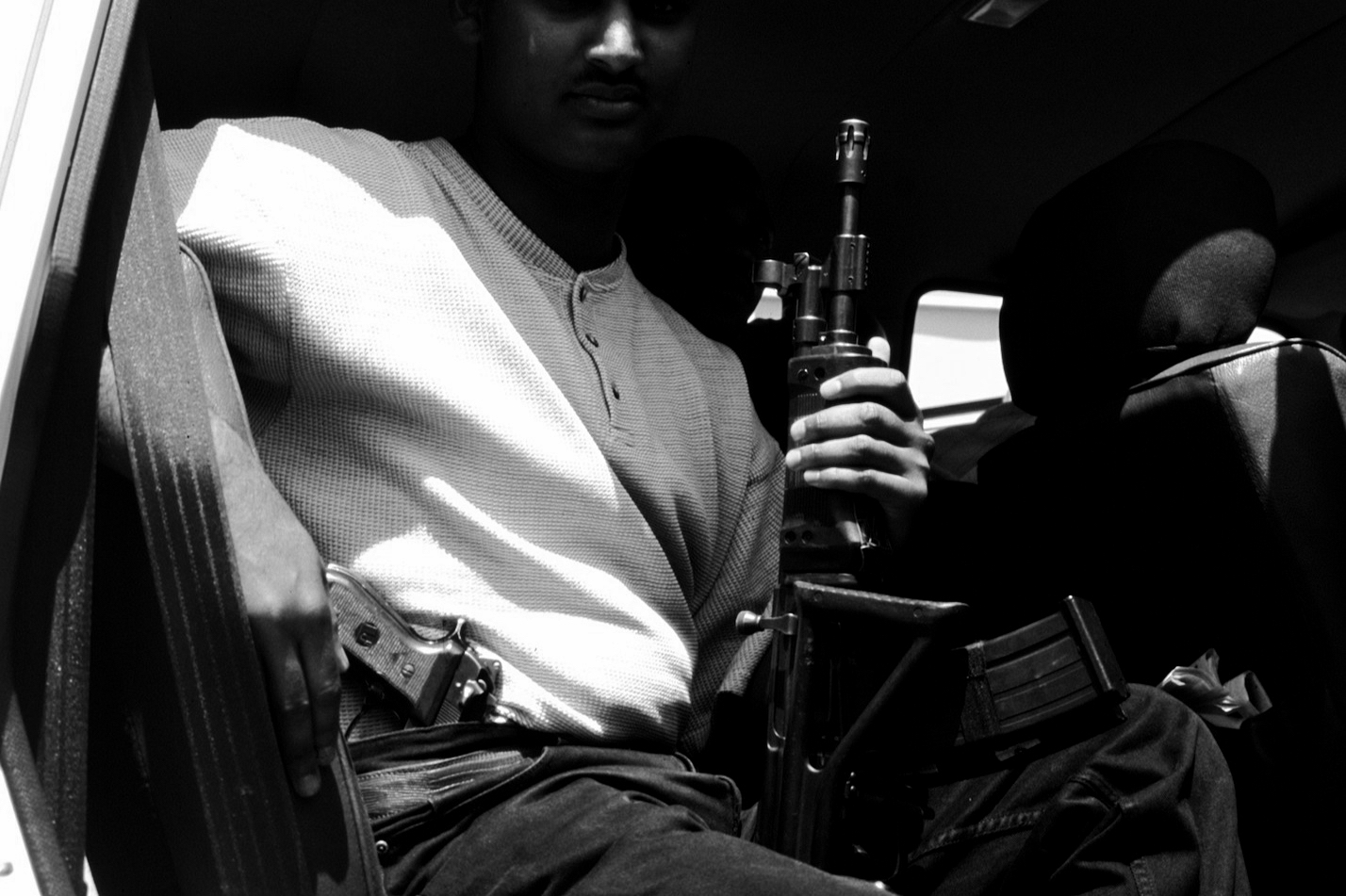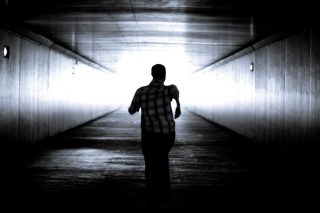Reflection | February 2018
So if you have been raised with Christ, seek the things that are above, where Christ is, seated at the right hand of God. Set your minds on things that are above, not on things that are on earth. (Colossians 3:1-2)
There are many things on earth to occupy our concerned attention, and so many of these are evil. This week Western media has been profiling the most recent US school massacre and the ongoing slaughter of civilians in Syria, but every nook and cranny of our planet has its story. I think of a friend of mine who escaped virtual slavery in a major city and returned to his tropical island, only to be caught one day by soldiers intent on the sandalwood he’d been harvesting. They beat him and left him hog-tied in a jungle clearing, to roast slowly to death under an equatorial sun. Mercifully, he escaped that too.
In the end, however, death is inescapable, as millennia of evidence tells us. Through death in particular, evil casts a very dark shadow. Death aside, our newsfeeds tell us that evil is pervasive and powerful. This can leave us overwhelmed, even frightened. Yet it is particularly unnerving when we see evil in our own words and actions or, perhaps worst of all, in the wicked things we have not committed but have considered.
There are, however, two vantage points on evil, and we have only one of them. We view evil from beneath. From this angle, evil is appalling and loathsome. It distorts, it corrodes, it violates, it perverts, it destroys, it steals life. This view from below is not inaccurate — evil really is all these things. It is, however, a profoundly inadequate view.
In Colossians 3:1-2, Paul* introduces us to a quite literally superior vantage point. He calls us to see things from above “where Christ is, seated at the right hand of God.” This, it turns out, is the only objective and accurate vantage point in the cosmos. Seen from above, evil is but a grubby shadow in the light of the glory of God and, most particularly, in the light of the risen Christ. When Paul says “set your mind on things that are above”, he is not instructing us to fixate on heavenly bliss, but to set our mind on the reality that Christ is victorious and ascended to the cosmic throne. Paul is not referring to some spatial setting with a physical chair, but to the position of divine authority over all that exists and especially, if we take into account the preceding verses, all that exists to threaten us.
We wonder why God allows evil. It is not because evil is to him … well, not so bad. Neither is it because he is weak, nor is it because he callously uses evil for his own ends. Evil is utterly bad, but God is utterly good and utterly sovereign. God allows evil only because he is greater than it, and greater in an absolute sense. Yet this abstract principle only takes on its proper meaning when we see how God’s greatness over evil has been worked out in history, and on profoundly personal terms: for on the cross, as the Son of Man, he entered evil’s maw. Christ was consumed by the work of evil, and brought to his demise. Three days into death, he was vindicated and raised by God. To say that he overcame evil is not quite the right language: upon his righteous, broken body, evil collapsed in on itself. As the disciple Peter preached in his first sermon, “But God raised [Jesus] up, having freed him from the horrors of death, because it was impossible for him to be held in its power” (Acts 2:24, emphasis mine).
On the cross, God exposed evil for the fraud it is as a power and voided it forever (Colossians 2:11-15). The cross is not only the place of our forgiveness (writing off our crushing debt of sin), it resolved the problem of human “flesh” (our insatiable drive for control), and it “made a public spectacle” of all human and demonic “rulers and authorities” that oppress. God’s greatness over evil is not only absolute, it is not only personal, it is comprehensive and it is complete.
But it is not finished. In God’s economy there’s something essential about long historical processes. I believe this includes the process by which evil is exposed for what it is. Its failure at the hands of God’s love has to be witnessed within the unfolding of publicly visible, concrete events in history. The cross is that point in history where it became clear that evil cannot survive God’s will. But history is not over yet, and it is the task of the people of God to live out, in faith, the truth about evil. The enacted resurrection life of the Church between now and history’s end will complete God’s exposé of evil, bringing it to its end.
To follow Jesus is to be exposed, at some point, to evil, because Jesus goes wherever evil does its work. At other times evil comes to us as it does to all people, by circumstance, blindsiding us with its apparent potency, in a betrayal, in illness, in loss: its faces are many. Whether it has come by vocation or circumstance, Scripture calls us to not be afraid of evil — again, not because it isn’t actually so bad; it most certainly is — but because it lies, ineffectual, beneath the feet of Christ.
And yet, the work of the cross has not been fully described if we stop here at the call to courage. The cross calls us to hope. The victory of God in Christ lies not only in his forgiveness of sin, his repair of the human condition or his vanquishing of evil. It takes the harm and hurt of evil and replaces it with something far greater and more beautiful than that good which evil first assaulted. Which is why another author says that for “the joy that was set before him [Jesus] endured the cross” (Hebrews 12:1-2). Jesus knew that although his journey took him into death, into the very heart of evil, it was not evil that had the say as to the actual outcome. Instead, the outcome was certain to be a matter of joy, because the outcome was in the hands of his good Father (and your good Father and mine). The lesson of the cross is that our good Father’s greatness over evil is an absolute greatness defined not by raw power, as we know it, but by total love, total holiness, total goodness and sheer, vibrant, unquenchable, absolute life. Elsewhere Paul uses the language of “new creation” to sum all this up. It is a place full of “glory” (2 Corinthians 3:7-11 & 5:17, Romans 8:18-30, Revelation 21).
Viewing evil from below engenders the animalistic responses of freeze, flight or, very often, fight. As a veteran justice leader once said to me after he led the US delegation to a global conference on injustice, “I have never seen so much anger and hate in one venue.” Anger is appropriate as a catalyst for justice, but not as a driver of justice. A Christ-centred vantage point on evil breeds neither passivity or aggression. Hope, brought to us by the cross of Christ, transforms our anger at evil into love-filled action. Viewing evil from above allows the Christian to fearlessly follow Jesus into the space of the harmed and into the space of the ones who do harm, and do the work of reconciliation that is the forerunner to the work of justice.
On this path harm may come to us too, even death. Yet, the self-emptying act of “taking up our cross” (Luke 9:23) to follow Jesus is precisely where, in fact, life dwells, and evil cannot hold up under its sheer vitality. By the indwelling of his Spirit, we become vessels of God’s vitality (2 Corinthians 4:7-12). This is true now, but also on the other side of whatever evil befalls us:
… for you have died, and your life is hidden with Christ in God. When Christ who is your life is revealed, then you also will be revealed with him in glory. (Colossians 3:3-4)
Glory is not a place, it is a condition. It is divine vitality. I have seen it manifest most clearly, not in some spectacular event or accomplishment, but in the dying days of followers of Jesus. It was as if an inner light were bursting out of the cracks forming as death laid its heavy blows upon their “jar of clay”, a glory impatient for the full revealing that is moments away. I recall a believer whose life had generally been characterized by a fearful and clumsy faith, yet their last days were marked by grace, irrepressible beauty, and hope. This is not the pallid hope of a wishful belief in an afterlife. It is a vivid, weighty hope, because Jesus has actually, concretely conquered evil in the course of history, and stolen its greatest weapon: death. It is a hope that comes alive because the risen Christ is not a concept, but present, by his Spirit, in the person who believes.
Therein lies the hope of the world in its suffering, of the school kids in the recent shooting in Florida, of the savaged citizens of Syria and Iraq, of the loved one on their death bed, and indeed of the Church that is so often decried from within and without. Therein lies your hope and mine.
————————
*Note: there is debate over who authored Colossians and Ephesians.




Recent Comments